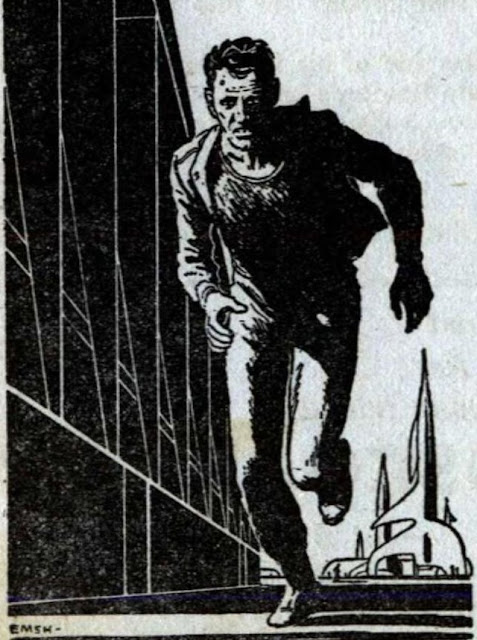"Faithfully Yours."
By Lou Tabakow (1915-81).
Illustrations by Emsh (1925-90; HERE).
Reprints page (HERE).
Short story (15 pages).
Online at Archive.org (HERE).
"On and on past the thinning stars raced the patient electronic bloodhound; invisible, irreversible, indestructible; slowly, but inexorably accelerating."
Just like Dante in his Divine Comedy, Tee Ormond must travel through Hell and Purgatory, to reach, at long last, Heaven; it's too bad he can't stay there . . . .
Main characters:
~ The biophysicist:
"He got clean away."
~ The Director:
"You have the pattern, I presume. Feed it to Fido!"
~ Jo:
"How about another rainbow? If you get enough of them in you, you won’t notice the heat — you won’t notice anything."
~ Tee Ormond:
"Tee whipped a stun-gun from inside his jacket and waved it at the clerk’s back. It caught him in midstride, and unbalanced, he crashed heavily to the floor. Tee glanced briefly down as he stepped over the paralyzed form, avoiding the accusing eyes, and snatched the magnetic key off the hook."
~ Yule Larson:
"I'm offering you a full partnership on a two million credit salvage deal and you want to back out because it’ll take six months. On top of that you’re broke and stranded and your hanger bill gets bigger every day. If you don’t take me up on this deal, you’ll still be sitting here six months from now wondering how to get your ship out of hock — if you don’t get caught first."
~ Jenner:
"You can’t wait a month? We’ve got four million tied up in that ship and you tell me you can’t wait a month."
~ The prison administrator:
"Hades has six billion prisoners at any given time. If one did manage to escape, they couldn't very well alert a million planets. Each planet has its own police force and handles its internal crime in its own way. What’s legal on Aurora might very well be illegal on ten thousand other planets and vice versa."
~ Dr. Chensi:
"Yes, the old settlers named our planet well."
~ Lara:
"I think we should start the patient walking tomorrow. Now you’d better get some sleep. You’re still very weak, you know."
~ Ary Mefford:
"It’s already too late. I’m sorry."
Typo: "hanger bill".
References and resources:
- "the Okefenokee Swamp": "Way down upon the Swanee River":
"The Okefenokee Swamp is a shallow, 438,000-acre (177,000 ha), peat-filled wetland straddling the Georgia–Florida line in the United States" (Wikipedia HERE; also see HERE).
- "a type G sun": Like everything in nature, stars come in all sizes and colors:
"A G-type main-sequence star (Spectral type: G-V), often called a yellow dwarf, or G star, is a main-sequence star (luminosity class V) of spectral type G. Such a star has about 0.9 to 1.1 solar masses and an effective temperature between about 5,300 and 6,000 K. Like other main-sequence stars, a G-type main-sequence star is converting the element hydrogen to helium in its core by means of nuclear fusion. The Sun, the star to which the Earth is gravitationally bound in the Solar System, is an example of a G-type main-sequence star (G2V type)" (Wikipedia HERE).
- "Elysia. I seem to remember an old old myth brought from the original Earth":
"Elysium, otherwise known as the Elysian Fields (Ancient Greek: Ἠλύσιον πεδίον, Ēlýsion pedíon) or Elysian Plains, is a conception of the afterlife that developed over time and was maintained by some Greek religious and philosophical sects and cults. It was initially separated from the Greek underworld—the realm of Hades. Only mortals related to the gods and other heroes could be admitted past the river Styx. Later, the conception of who could enter was expanded to include those chosen by the gods, the righteous, and the heroic. They would remain at the Elysian Fields after death, to live a blessed and happy life, and indulge in whatever employment they had enjoyed in life" (Wikipedia HERE).
- "A line from an old poem sprang to his mind: 'We are the dead, row on row we lie — '": Over a hundred years old but still not completely forgotten:
"'In Flanders Fields' is a war poem in the form of a rondeau, written during the First World War by Canadian physician Lieutenant-Colonel John McCrae. He was inspired to write it on May 3, 1915, after presiding over the funeral of friend and fellow soldier Lieutenant Alexis Helmer, who died in the Second Battle of Ypres" (Wikipedia HERE).
- "The close-packed suns of the central hub lay far behind. Here at the rim of the galaxy the stars lay scattered, separated by vast distances": The Milky Way galaxy is, to put it mildly, rather large—and yet, compared to the universe, it's like a grain of sand on a beach:
"The Milky Way is a barred spiral galaxy with an estimated visible diameter of 100,000–200,000 light-years. Recent simulations suggest that a dark matter area, also containing some visible stars, may extend up to a diameter of almost 2 million light-years. The Milky Way has several satellite galaxies and is part of the Local Group of galaxies, which form part of the Virgo Supercluster, which is itself a component of the Laniakea Supercluster. It is estimated to contain 100–400 billion stars and at least that number of planets. The Solar System is located at a radius of about 27,000 light-years from the Galactic Center, on the inner edge of the Orion Arm, one of the spiral-shaped concentrations of gas and dust" (Wikipedia HERE).
~~~~~~~~~~~~~~~~~~~~~~~~~~~~~~~~~~~~~~~~~~~~~~~~~~~~~~~~~~~~~~~~~~~~~~~~~







No comments:
Post a Comment